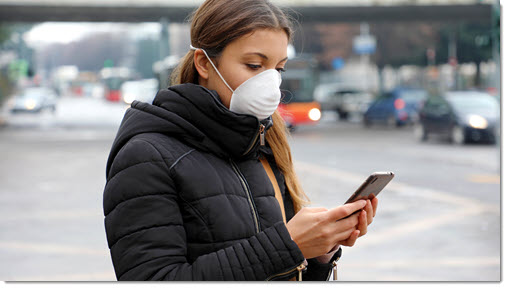
Health authorities could track your location and use the data to monitor and model the spread of Covid-19. It would help researchers learn how long the virus survives on a surface, what percentage of the population is asymptomatic, and where to target medical resources. The government could compare your movements with those of known coronavirus patients and alert you if you came into close contact.
All of those things have been done or are being considered by several countries.
China used apps and location data from phone carriers to track its population as it tried to keep coronavirus from getting out of control.
Iran encouraged millions of citizens to download an app to diagnose coronavirus. Researchers discovered that the app was actually spying on users and reporting everyone’s movements to the government.
Israel just announced that it will use location data from cell phone carriers to trace the movements of individuals who test positive for coronavirus.
Here’s a report from South Korea:
“The authorities have sent out texts detailing the movements of specific people infected with Covid-19, stirring up public shaming and rumor-mongering. The government is also using a smartphone app to ensure people stay home when they have been ordered to quarantine themselves.”

In the US, the federal government is reported to be in talks with Facebook, Google, Amazon, and other tech companies about ways to use location data to learn how coronavirus spreads and to see whether people are practicing social distancing.
Smartphone surveillance and location tracking by the government might seem like an effective tool against coronavirus. Like the other things we’ve been discussing in this series, it’s difficult to weigh the pros and cons and decide whether it would do more harm than good.
There is some value in data that has been anonymized and scrubbed of personal information. So far, that’s all that has been discussed in the US with the tech companies. Still, extraordinary diseases may call for an extraordinary response, and the pressure will ratchet up to turn identifiable personal location data over to the government.
China has reacted aggressively and apparently successfully to Covid-19. One of its tools was an app that citizens were encouraged (or compelled) to install on their phones. The app was developed by three government agencies and announced with a flurry of publicity. It aims to let people know whether they are at risk of catching the disease based on whether they have been close to someone who has it. A text alert is displayed if you have been in close contact with confirmed cases or suspected cases, including coworkers, students in a classroom, flight attendants, or passengers within three rows of a sick person on a train or plane.
The Chinese app requires users to identify themselves. The information from the app dictates whether a person should be quarantined or allowed into subways, malls, and other public places.
An app like this is only effective if a large number of people install it, so governments either have to effectively force people to install the app and consent to being tracked, or supplement the reports from the app with data obtained from other sources. China has used facial recognition and drones to monitor sections of the population.
It appears Israel is not going to bother with an app. Israel’s government intends to use surveillance measures originally developed for counterterrorism to track its population. Israeli prime minister Benjamin Netanyahu explained, “I refrained as prime minister from using these means among the civilian population until now, but there is no choice. We are waging a war that obligates using special means.”
The US places a high priority on privacy and civil rights. We might be willing to give up freedoms today to be safe, but “temporary” emergency measures have a way of continuing past when they’re necessary and being used for purposes that were never imagined at the outset. If you phrase it as “stopping coronavirus,” it sounds great. If you phrase it as “establishing a national database for government surveillance,” it sounds more troubling.
The possibility of using location tracking to stop coronavirus perfectly encapsulates the tension between the usefulness of new technology and the dark side of its misuse. I have one more article in this series, about the bad things that can happen when our location is tracked and the information gets in the hands of the wrong people. It was too depressing to publish this week in the middle of a pandemic, but I’ll have to take you there next week.
